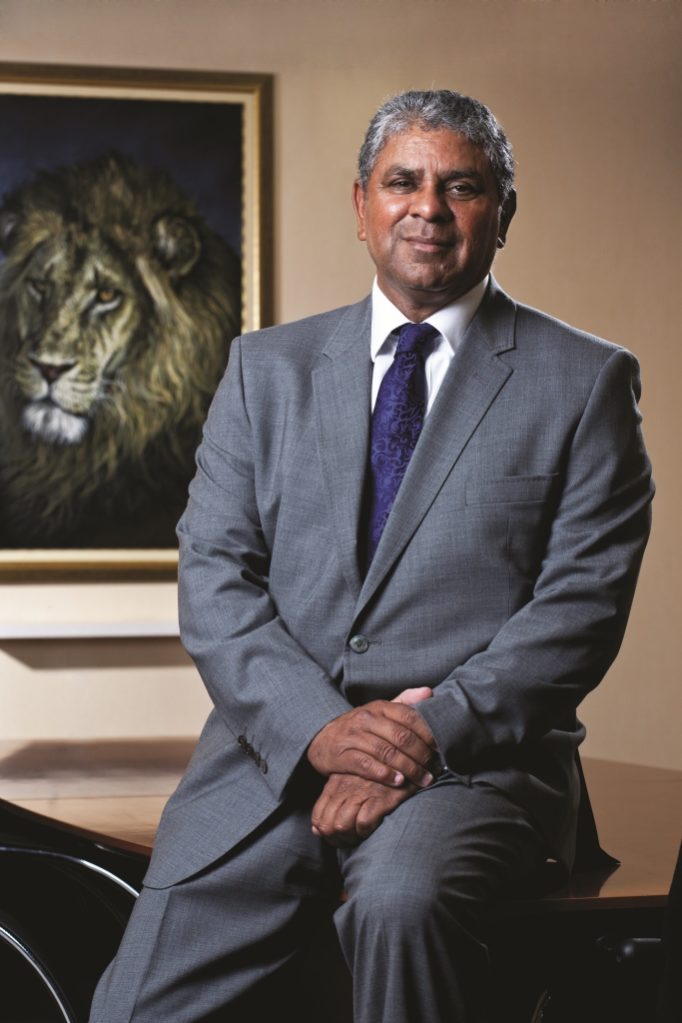It was a rough existence. He was on the road most of the time, knocking on doors to peddle insurance. At the end of a long day, he slept in his car and freshened up the next morning in the grimy toilet of a petrol station. Today, Fred Robertson’s life couldn’t be more different. As executive chairman of Brimstone Investment Corporation, he manages a company with a market capitalization of more than $432 million.
From early on, Robertson knew that only hard work and persistence would move him up in life. He and his eight brothers and sisters grew up in the infamous District Six of South Africa’s second largest city, Cape Town, from which they were forcibly removed in the 1970s, when the apartheid government crushed the economic power of the country’s black populace.
Robertson’s parents, who were both workers, were struggling to make ends meet.
“Everyone had to pitch in. I always had a job throughout school. I used to sell newspapers and fruit and vegetables. I worked in movie houses and sold ice-cream, chips and chocolates during intervals,” says Robertson.
After he left school, Robertson first worked as an unqualified teacher, then attended a teacher training college and taught for another few years at a township high school. In 1980, Robertson became an insurance salesman for financial services giant Old Mutual. For five years, he sold health and retirement policies from door to door.
Loading...
“It was the hardest job you could ever imagine,” he says.
Fast-forward to 2013. Robertson is one of South Africa’s finest entrepreneurs and has climbed to the top of the very company where he first started out: he is a director of the Old Mutual Emerging Markets board as well as a shareholder. At Brimstone and its subsidiaries—Lion of Africa Insurance, Sea Harvest fishing company and House of Monatic corporate wear—Robertson employs more than 3,000 people.
“I am chuffed about that. I never could have imagined I would do so well,” he says.
It was a long way to get there. First, Robertson worked his way up from salesman to managing one of Old Mutual’s branches. A few years later, in February 1990, he decided to exchange job security for the thrill of launching his own business, insurance brokerage Commlife, which he later expanded to include financial services.
“I’m an entrepreneur at heart. I wanted to make it by myself,” he explains.
The 1990s was an exciting time in South Africa, when apartheid was finally coming to an end. A day after Robertson started Commlife, the African National Congress (ANC), which had been operating underground, was unbanned. Two weeks later, Mandela was released from prison.
“He actually slept at my house a couple of weeks after his release. I was close to people in the ANC and fortunate enough to be trusted. My proudest moment was when Mandela was holding my baby daughter on his lap,” Robertson remembers.
The incident settled his conviction that the time had come for South Africa’s downtrodden majority.
“I had a sense the world was going to open up,” he says.
Together with his accountant Mustaq Brey, Robertson started to organize breakfast shows to create networking opportunities for business people in Cape Town.
“The shows built up and marketed our firms. We noticed that South Africa was changing on a political and economical level. So we put our heads together,” Robertson says.
Robertson along with Brey, who is now Brimstone’s CEO, each took out a loan of $2,700 and raised money from their client bases, who were mainly ordinary working-class men and women.
“People showed tremendous faith in us with the little money they had. We knew we had to work extra hard. We could not disappoint them,” Robertson says.
They didn’t. The numerous small investments quickly added up to a nice sum. Robertson and Brey launched Brimstone in 1995 as a community-controlled empowerment group with an initial capital outlay of $325,000. Four years later, when they decided to list on the Johannesburg Stock Exchange (JSE), the portfolio’s worth had increased exponentially, reaching $54 million.
The occasion of the listing was a day Robertson will never forget. In honor of the hundreds of community investors, who had made Brimstone’s success possible, Robertson decided to arrange a live feed of the listing via a satellite link from the JSE to the Good Hope Centre in District Six, where he grew up. Surrounded by community investors, friends and family, Robertson watched on two big screens how Brimstone’s shares climbed up to $0.13 that day.
“It was a very proud moment. The atmosphere was ecstatic,” he says.
Over the years, investors have been rewarded handsomely for the trust they placed in Robertson and Brey. Brimstone’s share price increased a thousand-fold in the past 14 years, with profits up more than 90% at the end of this financial year and dividend income flow of more than $16 million. Of that, Brimstone paid out $6.5 million to shareholders, reserving the rest to repay debt and for new investments.
Major payouts like these are a key part of Brimstone’s empowerment philosophy, Robertson says: “More than half of the dividends go directly to black Africans. We have 20 non-profit organizations that are shareholders and more than a million beneficiaries. So the money is spread wide. We believe firmly that it’s not just about profit. We also have to contribute to transformation while doing business. Wealth creation is important, but wealth sharing is as important.”
Loading...
